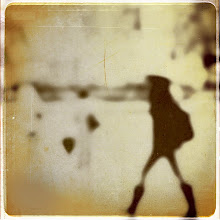It always happens this way. You get a
sore throat again and you think about all the previous times your throat had
been sore and you fail to remember them all. You take a slow shower without
shampoo or soap or anything. You’re just standing there, looking at the water
dripping down almost silently. You say to yourself, “It’s December”, but what
does that even mean now that you’re saying it like that, out loud, in the midst
of a soapless shower? The end-of-the-year bucket-lists, always carefully drawn,
never truly accomplished, start popping up everywhere in your head and you don’t
recognize half the things on them. You smile when you remember that time you
jotted down, “Maybe climb Mount Fiji?”. Your own naiveté can be adorable
sometimes, but most of the times is just that, naiveté. Your online banking
account pales in comparison. Actually, it looks sort of humble and hungry. But
who cares, the screen(s) in front of you surely don’t. They’re offering you the
deals of your life, which mainly revolve around the things that you absolutely.
Must. Buy. For the people who mean a lot to you. You turn your already hurting
gaze away and another creeping thought comes to stir you up. You haven’t read
the books you wanted to read, not even those you absolutely swore it to
yourself you would. Your feet are cold, your fingers are bony from too much
typing and your doctor’s appointment in a couple of days’ time makes you
cringe. You think again about the virus you caught, the spiked fever and the obsessive
checking of the thermometer. You’re eating too much but fuck it. You should
drink more water but fuck it. You should stop watching so many Poirot re-runs
and watch the Oscar nominees but fuck it. It’s been six months since you’ve cut
your coffee and cigarettes intake to zero and you thought you’d be absolutely
ok with it but now you get a headache just by thinking about it. You haven’t
touched any though. You’re weak but you’re not that weak.
After slipping into the fluffiest socks
you own and touching your belly for the gazillionth time, you go back to
analyzing this year that’s coming to an end. You’re thankful you haven’t hit a
new low. You’re thankful for that night full of soft lights, when everything
changed without you even being aware of it. You’re thankful for those many
alcohol-infused evenings, that bowl of garlic soup and that coat that wasn’t
even yours, though it felt like a second skin. You have said “I love you” a
whole lot this year and actually meant it. That’s comforting. There have been
songs in every car you rode that have asked you to sing along and smile. Maybe
even laugh. You take a minute to sit down and actually truly acknowledge that it’s
December again. You’re lucky this time. The previous December had been a hard
one to swallow. Still, you realize it has been a hard year. You think about all
the things coming next year that are going to make it an incredible one. You’ve
stumbled over something full of grace. Or was it the other way around? You’ve
cried in different places, even different countries, in almost every month of
the last year. But it was your cry for the crying. A year ago you thought that
if you could collect all the tears you’ve shed in a big glassy jar and pour
them over the balcony, yelling the whole time, yelling louder than you’ve ever
yelled before, you might not have to do any of this again. But this time you
actually want to do all of this again. It’s December and the air is crisp and
your arms smell like baby skin. You’re tired. You’re still alive. Actually,
you’re living for two now. And it’s the scariest thing you’ve ever done. Ever.















